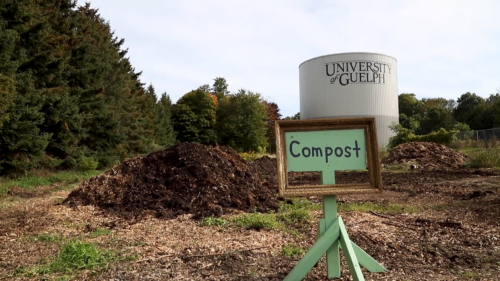The University of Guelph is “gold” when it comes to sustainability.
U of G has earned a gold rating from the Association for the Advancement of Sustainability in Higher Education (AASHE). The independent global organization assessed U of G’s sustainability efforts across academics, operations, community engagement, planning and administration, and innovation and leadership.
“It is so gratifying to see our commitment to sustainability recognized through this prestigious rating,” said U of G president Charlotte Yates.
“Lessening our environmental impact is a strategic focus and priority for the University. We have invested time and resources into ensuring our research, teaching, operations and interactions align with our commitment to contributing to a green future and to being a leader in advancing sustainability.”
 AASHE uses the Sustainability Tracking, Assessment and Rating System (STARS), deemed the most comprehensive and transparent framework for the post-secondary sector to measure and report campus sustainability efforts.
AASHE uses the Sustainability Tracking, Assessment and Rating System (STARS), deemed the most comprehensive and transparent framework for the post-secondary sector to measure and report campus sustainability efforts.
The STARS framework also allows universities to track their progress against the 17 United Nations Sustainable Development Goals.
STARS measures sustainability across five distinct pillars, including energy, water and food operations, teaching and research, and community engagement and responsible investing.
Highlights that supported U of G’s rating include:
- 94 per cent of departments engaged in sustainability research;
- 26 per cent of courses sustainability-focused or -inclusive;
- 90 per cent grounds managed organically;
- 30-year Sustainability Action Fund to advance campus sustainability actions and efforts;
- President’s Advisory Committee on Sustainability serving as a key resource to U of G leaders and the campus community;
- Initiatives including Fair Trade Campus, Guelph Student Food Bank and a ban on plastic straws;
- Healthy Workplace Certification from Excellence Canada;
- Stewarding valued resources as a pillar of the University’s Strategic Framework; and
- Participation in public policy (Smart Cities, Ontario Universities Committed to a Greener World, Bioproducts Discovery and Development Centre, World Economic Forum).
Globally, 1,014 institutions are members of AASHE, 90 of them in Canada. Nationwide, 16 Canadian universities have achieved a gold rating; four of them are located in Ontario.
 “Sustainability is an underpinning value of the University and the STARS rating is the latest reflection of that ongoing commitment,” Yates said.
“Sustainability is an underpinning value of the University and the STARS rating is the latest reflection of that ongoing commitment,” Yates said.
In November, the Gordon S. Lang School of Business and Economics MBA program was recognized by Corporate Knights as one of the world’s best for its focus on sustainability and corporate social responsibility.
In January 2019, U of G was one of the first Canadian universities to commit to reducing the carbon footprint of its endowment fund by 10 per cent over two years. Since then, the University has reduced the carbon intensity of its endowment by 17.5 per cent.
In April, U of G — in partnership with students, faculty and staff — committed to full divestment of holdings with fossil fuel reserves in its endowment fund over a five-year period. U of G is among the first Canadian universities to make such a divestment commitment.
U of G is a signatory to the United Nations Principles for Responsible Investment and has engaged in sector-wide discussions to pursue responsible investing and consider environmental, social and governance criteria.
The University is among the 15 members of the national Investing to Address Climate Change: A Charter for Canadian Universities, which encourages sustainable investment and transition to a lower-carbon economy.
“The University of Guelph has long recognized the importance of placing fewer demands on the planet,” Yates said.
“We have the opportunity and the responsibility to expand on previous efforts, enhance the profile of sustainability and connect it throughout the entire University. We must do our part to safeguard valued environmental resources for present and future generations.”
More information on U of G’s presidential sustainability efforts is available online.
[Transcript of video below}
